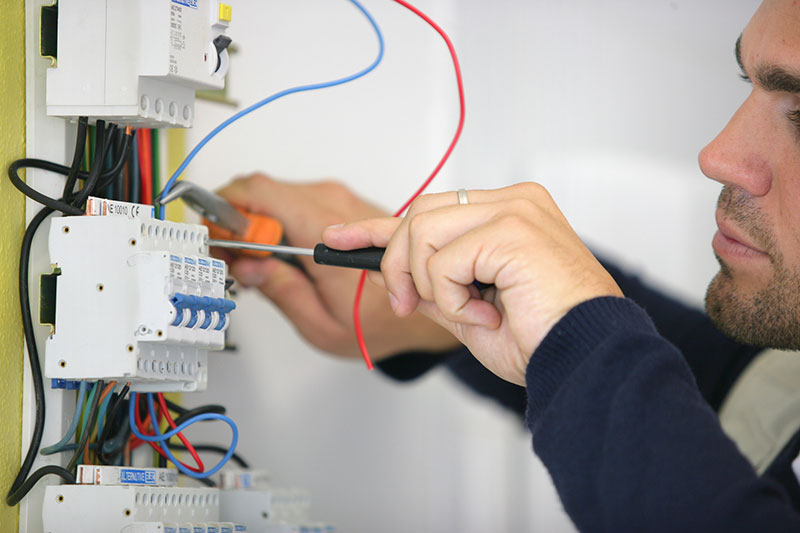The electrical system of every home includes either circuit breakers or (mostly in older buildings) fuses. The frequent blowing of the fuse is something that we do not want to deal with every day. Sudden switching off of all electrical devices and the inability to turn them on ruins our daily schedule, prevents us from relaxing, and nowadays even makes it impossible for us to do any work. If the whole house, apartment or only one of the rooms suddenly go dead – a fuse has probably blown. Unfortunately, this means an overload somewhere, the overheating of the circuit panel or any outlets or switches, or failure of one of the devices connected to the installation.
When looking for advice on the frequent breaking of fuses on the Internet, you may encounter a lot of tips, mainly concerning the technical operation of fuses or circuit breakers. This time let’s start differently. Let’s find out how the fuses work and what they’re actually for.
How Do Fuses Work?
Fuses are essentially fire breaks, or points of deliberate weakness, that collapse if power surges to prevent damage or fire. They are usually grouped in a box or on a panel with a cover – called a fuse box. They are one of the basic security features of the electrical installation of every building and protect your network against overload and overheating. So what does it actually mean when we say “the fuses have blown”? When fuses blow they’re simply executing their protective plan B—they force all the fuses to shut down to avoid circuit damage. When the meter uses more power than your installation has been adapted for – fuses instantly cut off the power supply. Unfortunately, there are many reasons why the fuses in your home can blow. The best way to find the cause of this “failure” is to disconnect devices from the power supply – one at a time. If, after lifting back the switches, the power supply is not interrupted – you have probably found the main culprit.
3 Most Common Causes of Blow Fuses
Now that you’ve had a quick reminder of how fuses work, let’s find out why they actually blow. The electrical system should work flawlessly, therefore many of the reasons why fuses keep tripping are related to poor maintenance or damage to the system. This is when you should call Wiktorowski Electrical Services to have a licensed electrician check out your electrical installation. If you hear strange or crackling noises, or if you’re encountering flashing lights, the fuses have blown because of:
Network overload
Network overload happens when too many devices are connected to the power at once. Powering all receivers uses too much combined power, and the fuses trip when it exceeds 10% of the circuit breaker’s full capacity. Nowadays, network overload happens mostly in older houses, which have outdated installations. An installation planned for a lower energy demand will not be able to keep up with more resource-consuming devices. In this case, you have to replace or renew the electrical installation.
 Obsolete fuses
Obsolete fuses
Frequently breaking fuses does not have to mean the necessity to replace the entire installation. It often turns out that it is the fuses themselves that are not able to function properly. Old fuses are more and more often replaced with new ones rated to a higher current load. They are characterized by a lower failure rate and greater resistance to high power consumption. Fuses should be replaced by a licensed electrician, and the replacement process itself usually does not take more than a few hours. We’ll take care of that for you, just give us a call and tell us what your problem is.
Damage to the electrical network
Power cuts aren’t always related to the circuit breakers. If your home electrical network goes out of service several times a week, the best solution is to contact a trusted electrician that will inspect your electrical system and check it for serious problems. Damage to your installation can be dangerous and all repairs should be performed by a certified electrician.
Damaged Electrical Equipment
Frequent fuse blowing situations may be caused by a damaged appliance connected to the circuit. A washing machine, iron or a TV, which suddenly takes up more power than usual, will blow up the circuit breakers. This is especially easy to observe when the fuses always trip when the device is plugged in or is turned on. Try to unplug the faulty equipment from the outlet and test the electrical installation with a different device. If the problem persists – check if any of the appliances needs high starting power. Replace your old microwave, vacuum cleaner or iron with a model that consumes less power and the problem should be solved.
Are Blowing Fuses a Good Reason to Call an Electrician?
 Of course. Remember that tripping fuses is a very common problem. Electrical system failures often do not show visible signs, and frequently tripping fuses can be one of the clues. You can eliminate the simplest causes of blown fuses on your own. Remember to check the various configurations of connecting devices to the sockets in your home and to replace old electrical equipment with new ones. However, if you know that your apartment or house uses an outdated installation or the electrical system has not been inspected by an experienced professional for a long time – call Wiktorowski Electrical Services today.
Of course. Remember that tripping fuses is a very common problem. Electrical system failures often do not show visible signs, and frequently tripping fuses can be one of the clues. You can eliminate the simplest causes of blown fuses on your own. Remember to check the various configurations of connecting devices to the sockets in your home and to replace old electrical equipment with new ones. However, if you know that your apartment or house uses an outdated installation or the electrical system has not been inspected by an experienced professional for a long time – call Wiktorowski Electrical Services today.
Contacting a licensed electrician will help you fix the problem without exposing yourself and your loved ones to unnecessary danger.


